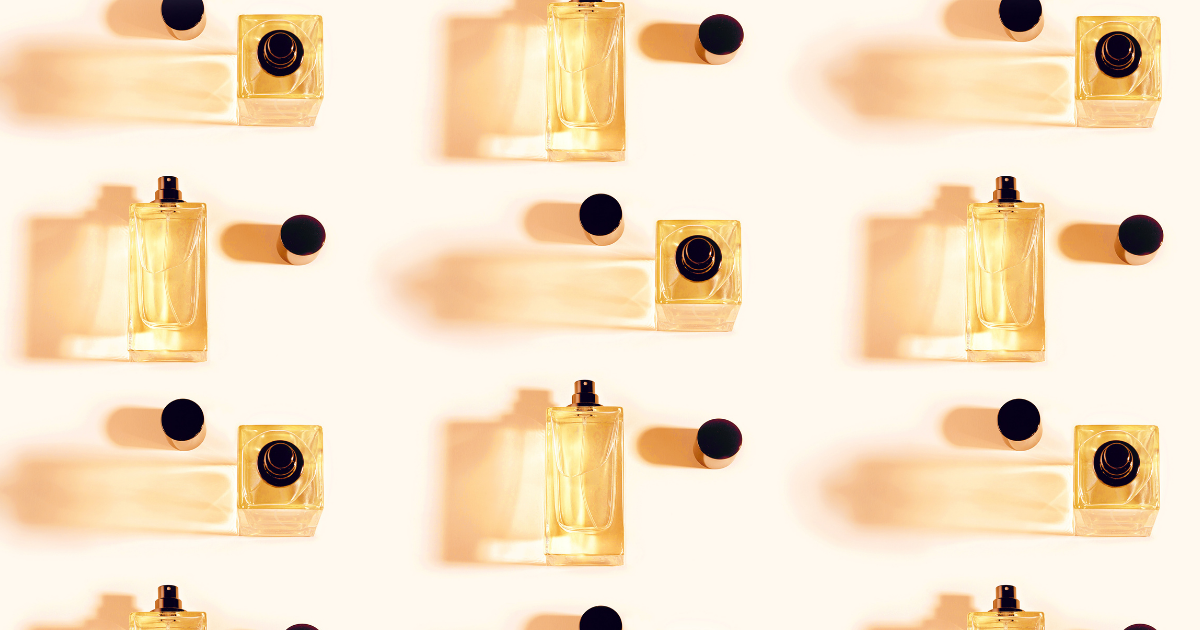Is Fragrance Toxic? Miranda Kerr Certainly Thinks So—But Does The Science Add Up?
Separating fragrance facts from fear


Celebrity news, beauty, fashion advice, and fascinating features, delivered straight to your inbox!
You are now subscribed
Your newsletter sign-up was successful
Last week, model and KORA Organics founder Miranda Kerr appeared on The Dr. Hyman Show, a popular functional-medicine podcast, to discuss her recent health journey and the lifestyle changes she believes have transformed her wellbeing. One shift, she explained, was cutting out synthetic fragrances entirely—so much so that she now has a strict no-fragrance policy in her home, rooted in her belief that such scents can cause “disruptions” in the body.
“I have a no-fragrance policy for anyone coming into my house because I don’t do that around my children,” Kerr said. “It’s really disturbing, to be honest, how unaware people are.”
Although she didn’t specify exactly what those bodily “disruptions” might be, she referenced her mother’s cancer diagnosis (Kerr was a teenager when her mother was diagnosed with a rare spleen cancer). Dr. Mark Hyman went further, drawing direct links between synthetic fragrances and cancer risk, hormone disruption, cumulative long-term exposure and regulatory gaps.
“As a doctor, I’m very aware of these things—links to cancer, reproductive health,” he said. “They’re often endocrine disruptors. They can mess with women’s hormones. They can be very toxic. And you’re not just doing it once—you’re exposed every day for decades. That’s what concerns me.”
These are undeniably alarming claims. Anyone listening could walk away feeling anxious, if not completely terrified. But are these warnings grounded in scientific evidence? Or do they border on sensationalism—attention-grabbing, scaremongering soundbites designed for clicks and virality? And, perhaps cynically, is it worth noting that both guests have a financial motive to make such claims—Kerr’s KORA Organics range that focuses on naturally-derived ingredients, and Dr. Hyman’s supplement brands and his functional-testing company offering $499 annual diagnostic memberships? Just a thought.
To cut through the noise, we reviewed every independent, peer-reviewed, double-blind study available—the gold-standard research—examining the potential negative health effects of fragrances. Here’s what we found.
Is Fragrance Toxic: The evidence for hormone disruption
One of the biggest claims made by Dr. Hyman was that synthetic fragrances are endocrine disruptors and interfere with women’s hormones. But the evidence paints a far less definitive picture (if not a different image entirely).
Celebrity news, beauty, fashion advice, and fascinating features, delivered straight to your inbox!
Most of the findings come from animal or in-vitro studies, where researchers test individual fragrance chemicals (not finished perfumes) in isolation. And, crucially, the doses used in these studies are vastly higher than anything a human would ever be exposed to through perfume, body lotion or cosmetics. We're talking 100 to 10,000 times higher.
Let's take synthetic musks as an example. One study found weak hormone-like activity in rodents when they were exposed to 15-150milligrams per day. By contrast, human exposure is measured in micrograms (that's 1000 to 10,000 times lower).
Another commonly contended fragrance molecule is phthalates, which in animal studies showed hormone disruption when exposed to 10 mg/kg to 750 mg/kg per day. Human exposure is typically less than 0.01 mg/kg/day—100 to 75,000 times lower.
So, the bottom line is that some fragrance ingredients can behave like hormone disruptors under extreme laboratory condition, but there is no evidence whatsoever that fragrance in its consumer form disrupts human hormones.
Is Fragrance Toxic: The evidence for cancer risk
Kerr and Dr Hyman repeatedly allude to a link between synthetic fragrance and cancer, but the actual evidence for this is extremely limited. Much like the hormone-disruption claims, the concerns stem from studies on individual fragrance chemicals—usually tested in isolation, and often in rodents—where certain ingredients have shown carcinogenic potential. But these effects appear only at exposure levels hundreds to thousands of times higher than anything humans would ever encounter through perfume or cosmetics.
Crucially, there are no double-blind human studies demonstrating that perfume or fragranced products increase cancer risk. Regulatory bodies across the EU, UK and US closely monitor fragrance ingredients, restricting or banning any with established carcinogenic properties. In other words, the scientific evidence simply does not support the sweeping cancer claims being made.
Is Fragrance Toxic: Other adverse effects
There are some proven adverse health effects associated with perfume, though they are far more benign than the sweeping claims made by Kerr and Dr Hyman. The issues documented in high-quality studies tend to involve skin reactions, eye or nasal irritation, and respiratory symptoms in people with asthma or heightened sensitivity. Importantly, while these symptoms can be uncomfortable, the research does not show systemic toxicity. Objective measures, such as lung function tests or markers of inflammation, generally remain unchanged, suggesting that these reactions are irritant or allergic in nature rather than signs of deeper harm.
But could there be a cumulative effect?
Kerr and Dr Hyman also emphasised the idea that while a single spritz of perfume may be tiny, spraying it every day could allow harmful chemicals to build up over time. In theory, cumulative exposure is possible, but only under very specific circumstances and with particular ingredients. Some older synthetic musks, such as galaxolide and tonalide, are what scientists call persistent: they can accumulate in fatty tissue, and trace amounts have been detected in human blood in bio-monitoring studies. But presence does not equal harm. The fact that a chemical is detectable doesn’t mean it’s doing anything harmful—especially when levels are extremely low.
To put this in perspective, many everyday plant foods we consider healthy (including tofu, soybeans, grapes, apples, flaxseed and sesame) contain natural bioactive compounds that interact with our hormones far more strongly than any perfume molecule ever could. After eating them, these plant compounds can also be detected in our blood, urine and even breast milk. Yet far from being dangerous, these foods are consistently linked to better health outcomes. In other words, detection alone isn’t a marker of toxicity; it’s simply a marker of exposure.
A note on synthetics vs. natural fragrances
On the show, Kerr explains that her no-fragrance policy doesn’t extend to essential oils or natural scents. She’s a fan of them, even saying she applies peppermint oil to her skin, "to help with sebum production”. It’s a familiar wellness narrative: natural equals safe, synthetic equals harmful. But scientifically, that distinction simply doesn’t stand up.
For starters, studies show similar results for synthetic and naturally-derived fragrances when it comes to irritation and allergy. Dermatology and allergy reviews consistently identify essential oils as some of the most common allergens in cosmetics, and often recommending that people with sensitive or eczema-prone skin avoid them altogether.
Several essential oils—most famously lavender and tea tree—have also demonstrated hormone-like effects in rodent and cell studies, just as some synthetic fragrance ingredients have. But, exactly as with synthetics, these effects appear only at very high concentrations, far beyond anything you’d encounter in a scented moisturiser or a few drops of oil.
The bottom line
Dr Hyman and Kerr’s claims simply aren’t supported by the evidence. Yes, perfume can irritate sensitive skin or trigger symptoms in people with asthma—but the sweeping warnings about cancer, hormone disruption and long-term toxicity just don’t hold up to scientific scrutiny.
So go ahead—spritz, sniff and enjoy your signature scent without fear.

Lottie Winter is the Beauty Director at Marie Claire UK. With over a decade of beauty journalism under her belt, she brings a desire to cut through the noise and get to what really matters–– products that deliver, conversations that empower, and beauty that makes people feel like their best selves.